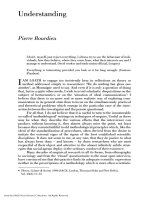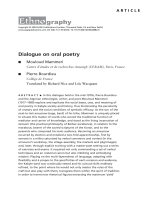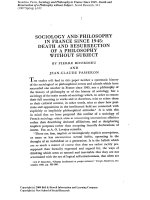Proofreading (Pierre Bourdieu)
Bạn đang xem bản rút gọn của tài liệu. Xem và tải ngay bản đầy đủ của tài liệu tại đây (44.79 KB, 3 trang )
"Proofreading"
Pierre Bourdieu; Gisele Sapiro; Brian McHale
Poetics Today, Vol. 12, No. 4, National Literatures/Social Spaces. (Winter, 1991), pp. 625-626.
Stable URL:
/>Poetics Today is currently published by Duke University Press.
Your use of the JSTOR archive indicates your acceptance of JSTOR's Terms and Conditions of Use, available at
JSTOR's Terms and Conditions of Use provides, in part, that unless you have obtained
prior permission, you may not download an entire issue of a journal or multiple copies of articles, and you may use content in
the JSTOR archive only for your personal, non-commercial use.
Please contact the publisher regarding any further use of this work. Publisher contact information may be obtained at
/>Each copy of any part of a JSTOR transmission must contain the same copyright notice that appears on the screen or printed
page of such transmission.
The JSTOR Archive is a trusted digital repository providing for long-term preservation and access to leading academic
journals and scholarly literature from around the world. The Archive is supported by libraries, scholarly societies, publishers,
and foundations. It is an initiative of JSTOR, a not-for-profit organization with a mission to help the scholarly community take
advantage of advances in technology. For more information regarding JSTOR, please contact
Sun Jan 27 05:45:46 2008
"Proofreading"
Pierre Bourdieu
Sociology, College d e France and Hautes Etudes en Science Sociales
1 have written these lectures, especially the first two, in order to discourage the reading that my works most often encounter, especially
abroad, but also in France: the reading that, privileging substantial
realities to the detriment of the relations in which they are embedded,
dwells upon certain phenomenal differences instead of seeking the
structural equivalents of the traits that have been described. 1 also
wanted to react against the inclination on the part of those who speak
about Japan, particularly orientalists, to constitute this foreign society
as an alien reality, radically exotic, thereby flattering the propensity of
the most conservative among the Japanese to identify themselves with
a national culture which was artificially established, in its most peculiar features, in the course of constructing the Japanese nation and
Japanese nationalism. Refusing the exoticism which, as a complacent
acceptance of exteriority, al~vaysexpresses a form of indifference and
even contempt, but not being able to propose a scientifically grounded
vision of Japanese society, I have resigned mvself to proposing, in a
refined form, the model of advanced societies that 1 have constructed
with regard to the purticz~lu~.
CUSP of French society. This amounts to
offering my Japanese audience the means of corroborating, correcting, o r refuting my analyses in the light of their practical or scientific
knowledge of their own society. It goes without saying that 1 have taken
this risk only after having read many historical and sociological works
which have convinced me that my model's claim to universal validity is
not totally groundless, on the condition, of course, that for each case
Poetics Tocia? 12:4 (Winter 1991). Copyright 0 1991 by 'The Porter Institute for
Poetics and Semiotics. CCC 0333-5372/911$2.50.
626
Poetics Today 12:4
modifications are introduced into the model wherever necessary. This
is why, after a subsequent experience of a similar type in East Berlin,
I have been led to introduce, besides the kinds of capital that must
be taken into consideration in the French case in order to account
for the distribution of agents in social space, a new kind of capital,
which I have called bureaucratic capital or party-apparatus capital;
and two Swedish researchers have gone on to conceive a variant of this
in order to explain the differences traceable to the social-democratic
movement.
This is why it seems to me that the "proofreading" to which I subjected myself in Japan has some chance of functioning equally well
in other cases, provided that my readers are willing to undertake for
themselves what I have undertaken in these Japanese lectures and to
substitute for the Japanese or French examples relevant equivalents
from their own societies.
Translated bq' Gzsele Sapiro; edited bq' Brian McHale.









